General
Mak Gender Mainstreaming Directorate Holds Reflective Workshop on Promoting Women’s Participation in Leadership
Published
2 years agoon
By
Mak Editor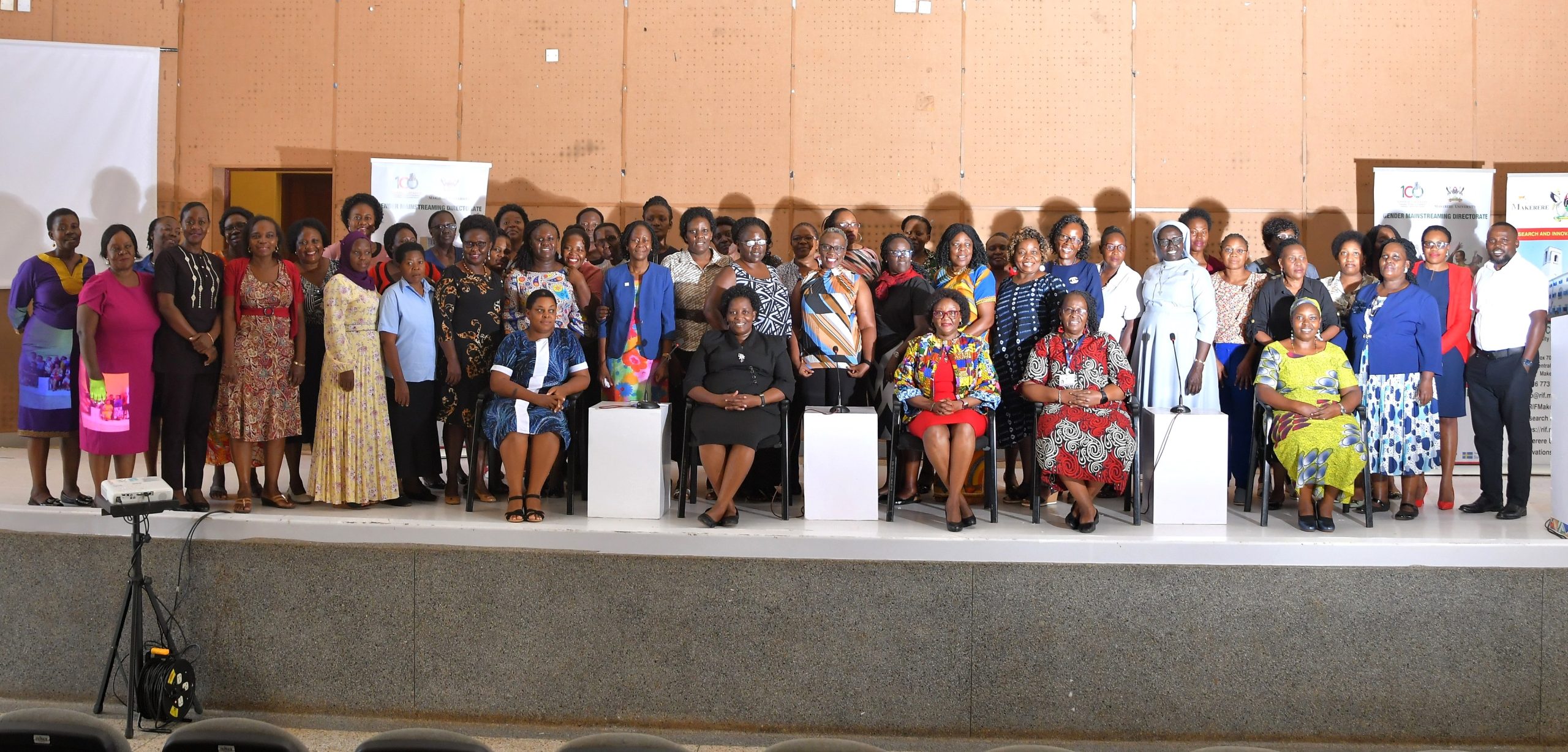
By Racheal Kanyi
“Position yourself and make yourself visible and known for something”, this was among the many takeaway points for participants at the reflective workshop for the women leaders at Makerere University. The workshop held on the 13th June 2024 in the Auditorium at the Yusuf Lule Central Teaching Facility (CTF 2) was convened by the Directorate of Gender Mainstreaming (GMD) at Makerere University. It was one of a series of activities that have been conducted by the Directorate under a project titled: Enhancing women’s participation and visibility in leadership and decisionmaking in Universities in Uganda through action and evaluation research, 2019-2024. This is one of the multi-year research projects funded under the Makerere Research and Innovations Fund (MakRIF) and is led by the Director GMD, Dr. Euzobia Mugisha Baine. Participating Universities are: Makerere, Gulu, Busitema, Mbarara University of Science and Technology, Kabale and Muni.
Purpose of the workshop
Held under the theme – Nurturing women in University leadership through mentorship and experience sharing, the purpose of the workshop was to provide a forum for experience sharing among female staff in middle and senior level leadership and management positions equivalent to M3-M5 salary scale.
Setting pace for experience sharing, the Director, Directorate of Gender Mainstreaming at Makerere University, Dr. Euzobia Mugisha Baine briefed participants on the mandate of GMD, outlining the policies and their role in promoting gender equality at the University. In her remarks, she noted that the mandate of GMD is derived from two main policies namely; i) the Makerere University Gender Equality Policy 2009, which envisions Makerere University to become a gender-responsive University in which substantive gender equality is reality, and ii) the Makerere University Policy & Regulations against Sexual Harassment of 2006, as amended in 2018 with a vision to coordinate, facilitate and monitor the integration of the gender dimension into the core functions of Makerere University including; Teaching and Learning, Research and Innovations, Knowledge Transfer Partnerships, and Support Services.
Dr. Baine noted that the purpose of conducting the workshop was;
- In response to two strategic areas of the GMD Gender Equality Policy namely;
- Gender-responsive staff recruitment, training, promotion and recognition (eg numbers of women and their progression),
- And promotion of women’s participation in leadership and decision-making organs (numbers and visibility).
Other objectives included; Providing an opportunity for participants to understand the gender and leadership landscape in Higher education, enable them appreciate the gender-based challenges along women’s career path and how to overcome them, and to generate strategies on how women senior staff can position themselves for future leadership.
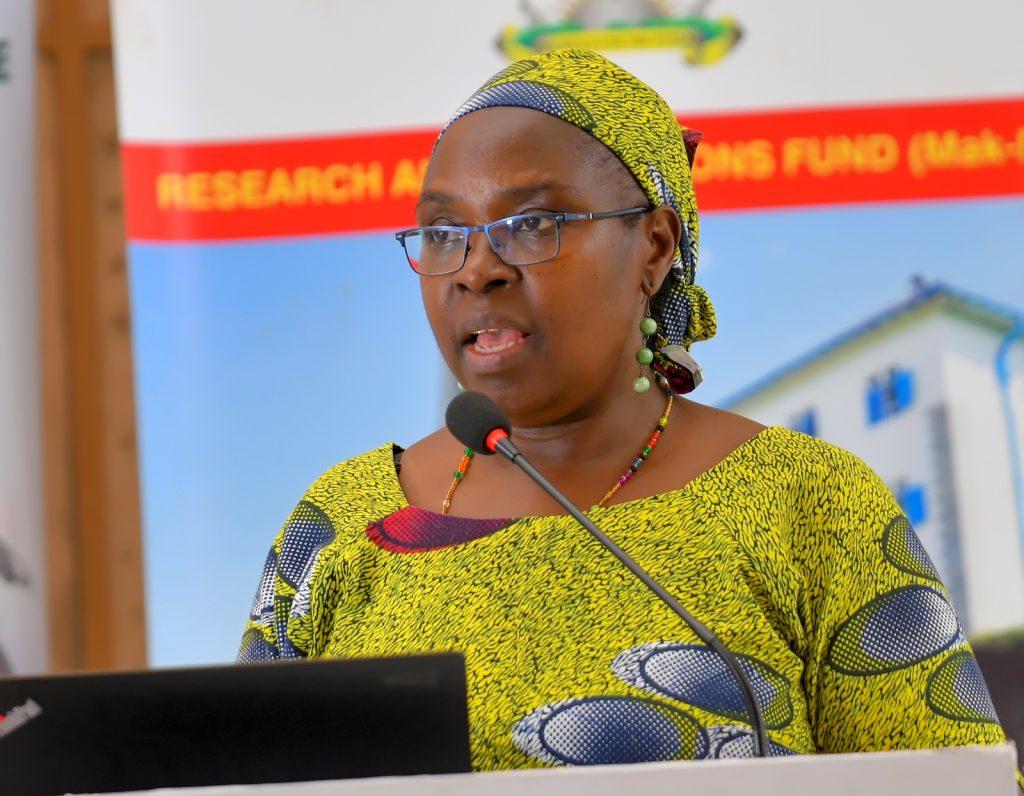
In her presentation, Dr. Baine who is also the project Principal Investigator, called upon women to gain confidence and stand out whenever leadership opportunities arise. “There is need for women to be on the discussion table, making decisions as opposed to keeping at the back. It is high time women gained confidence and took on these leadership opportunities. It all starts right from where you are,” she said.
Factors holding back women from taking up leadership roles
Presenting the research findings on behalf of the project team, Dr. Anna Ninsiima noted that despite all efforts at national and international levels, women were persistently fewer in leadership and decision-making organs in both public and private universities. The main objective of the study was to conduct a situational analysis of the gender terrain of the six public Universities to obtain baseline information encompassing: composition of governance and leadership organs by sex, composition of senior staff by sex, needs assessment and profiles of potential mentors and mentees, capacity to conduct gender-responsive research, exploration of men staff engagement in gender equality/equity interventions, and to establish a functional Uganda University Women Forum starting with the 6 universities.
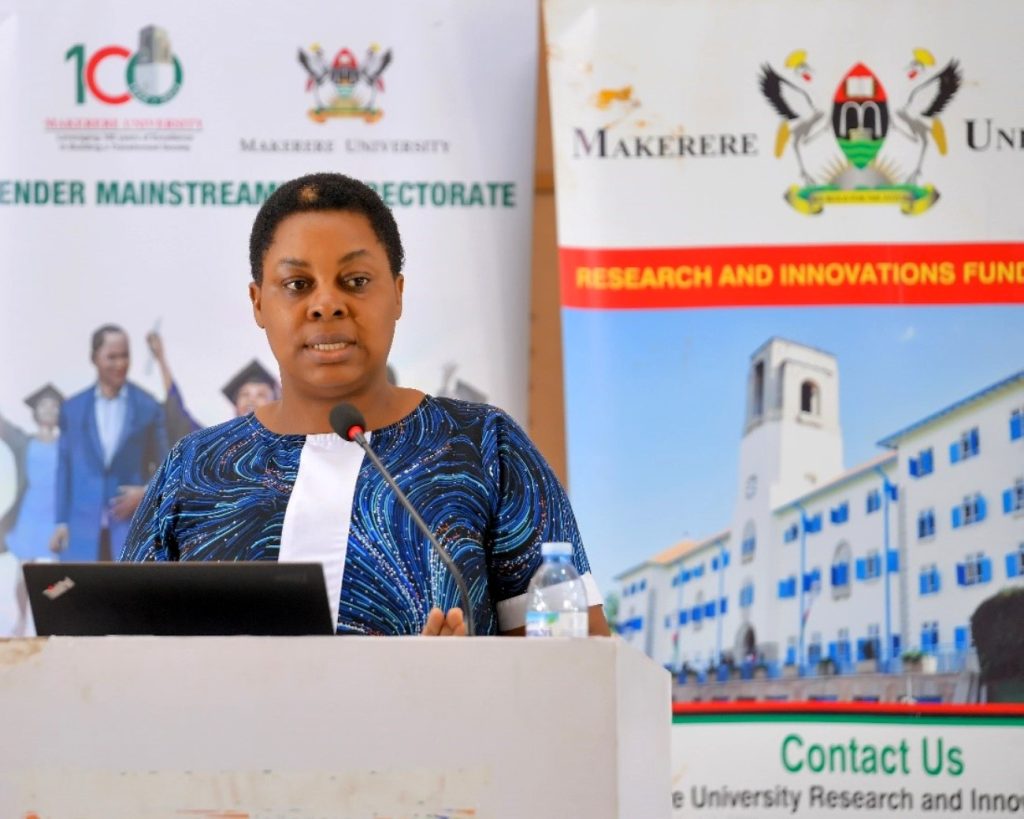
Dr. Ninsiima revealed that according to the feedback collected, the main causes of low numbers of women in leadership in universities were;
- A strong disconnection between the laws and policies at national level and the Universities,
- Patriarchal traditional norms and perceptions regarding female leadership, where there is unacknowledged institutional bias against women leaders,
- Top positions in the University are political and require women to do more background work, and to lobby their way into leadership positions,
- Institutional-toxic, militaristic environment. Unsaid resistance by institutions,
- Personal – poor self-image and esteem, want soft landing- some fear judgment,
- And social/family background.
Prof. Rhoda Wanyenze on promoting women’s participation in leadership
The Dean, School of Public Health, Prof. Rhoda Wanyenze urged women to dedicate time to understanding themselves better, capitalize their strengths, acquire soft skills and competencies, and to rebuke toxic talk if they are to effectively participate in leadership. “Leadership starts with understanding yourself. Speak to yourself, identify good things in you, know you capabilities and work on your weakness. There is need for women to mentor each other, its one way of uplifting ourselves. We also need to know that not everyone can make it into leadership – some of us have to open doors for others to get there. Let’s sponsor each other and avoid toxic talk that holds us back and encourage each other into these leadership spaces,” she noted.
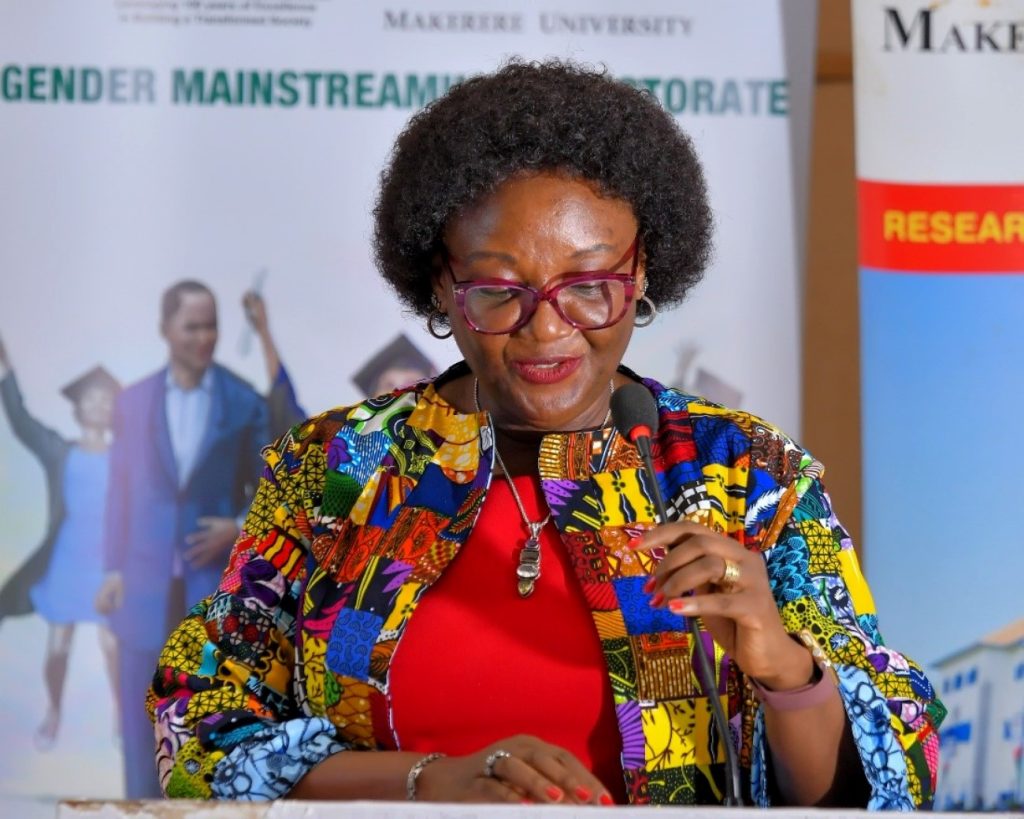
Strategizing for leadership
Sharing on her leadership experience, the Deputy Vice Chancellor Academic Affairs, Bunyoro University, Prof. Grace Bantebya Kyomuhendo advised women to strategize and use every opportunity available in leadership by showing up, even when they know they will not win the race. “Mere showing interest is a visibility gate for you to be known and adopt good networks in the world. If you intend to be a leader, study the big picture. You have to prepare, get the skills, get collaborations, know what you want, be available and willing to take on responsibilities. Study the environment and be careful how you share your intentions with people. If there is an opportunity and you have interest in it, apply for it, if you go through, that’s great, if you don’t, you won’t die, other doors will still open,” she advised.
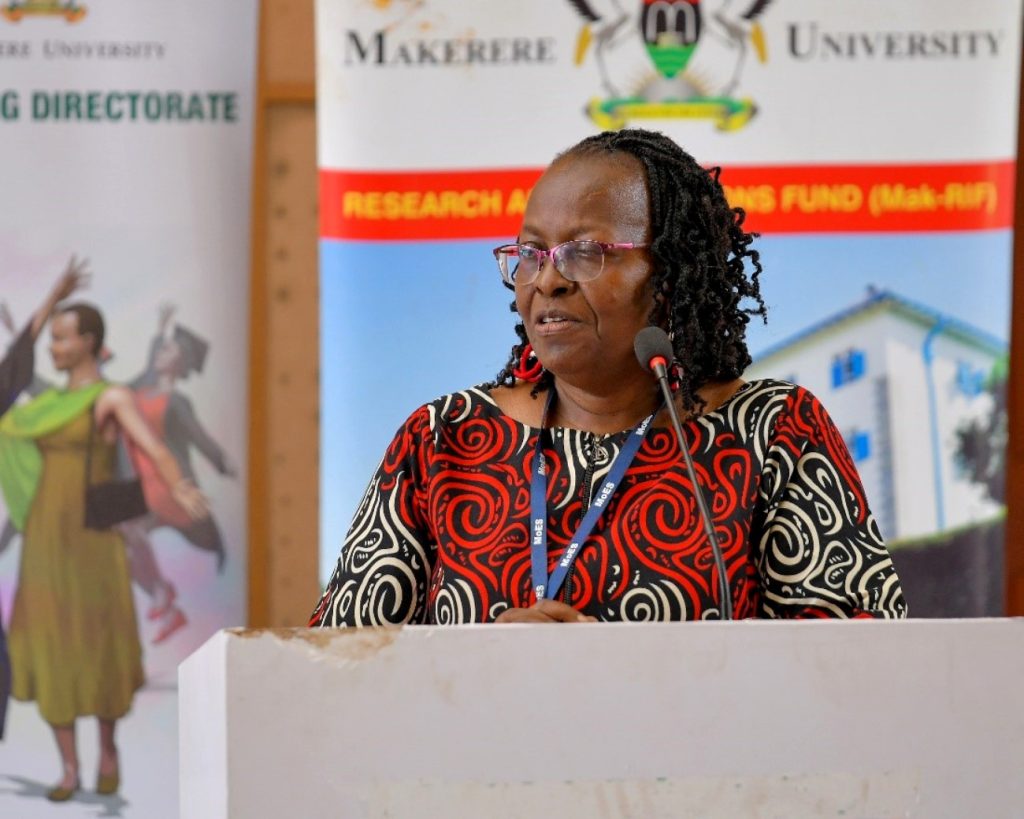
Genesis and mandate of GMD
The Chairperson Makerere Council Committee responsible for Gender Mainstreaming who also doubles as the Dean, School of Women and Gender Studies, Prof. Ssali Sarah revealed that the Gender Mainstreaming Directorate came to existence by visionary women who also contributed to the establishment of the School of Women and Gender Studies with mainly two objectives;
- To promote gender parity
- To monitor and hold people accountable
She reiterated the need to address the behavioral and structural barriers that limit women from rising and staying in leadership noting that this will help have more women occupy the leadership spaces in the universities.
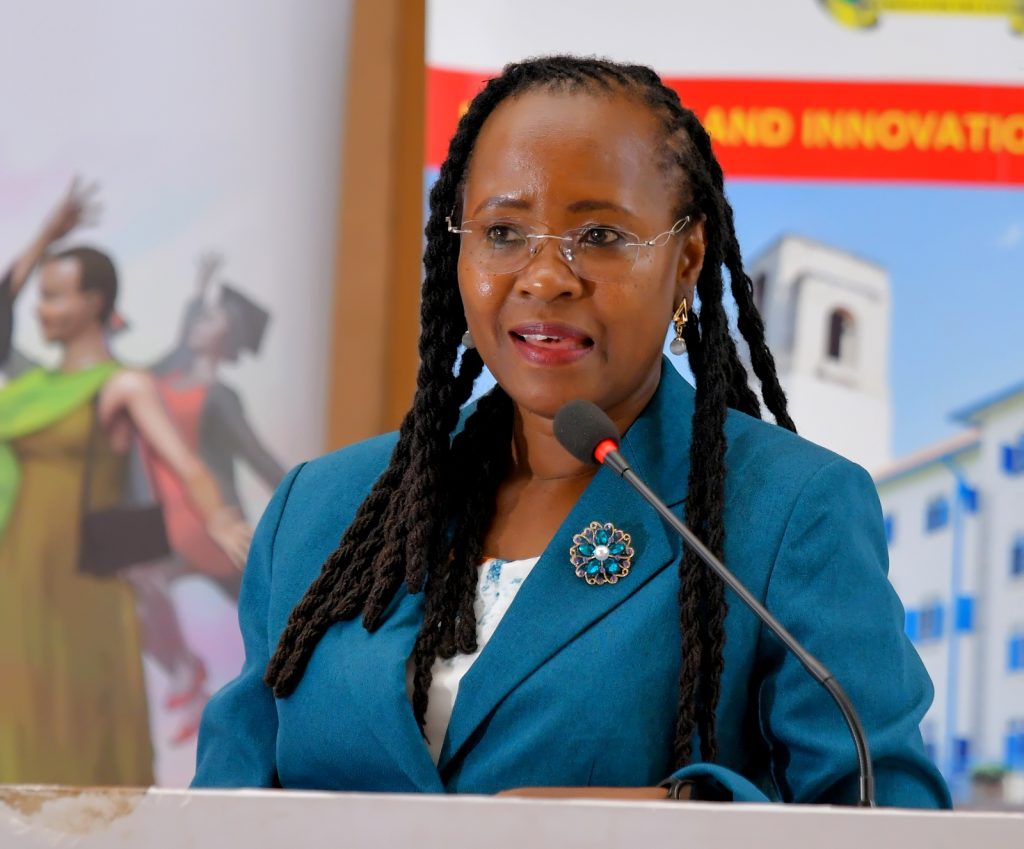
The newly appointed Principal, College of Humanities and Social Sciences (CHUSS), Prof. Helen Nkabala urged women to acquaint themselves with the different university policies if they are to effectively compete and take on leadership positions. “Know what is required of the leadership space you are vying for. You need to do policy spotlighting and read the human resource manual well as you aspire for leadership,” she advised.
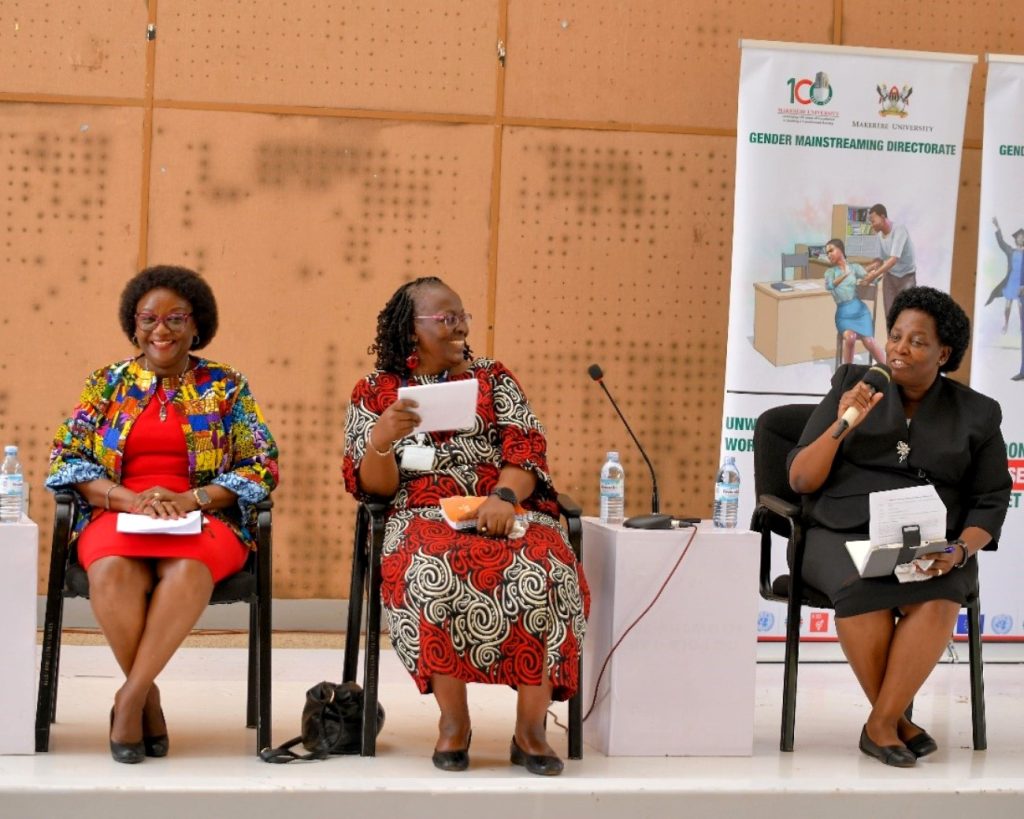
Emphasizing the need for women to support each other into leadership, she appreciated Prof. Wanyenze for looking out for her when she showed interest in taking up leadership in the Makerere University Academic Staff Association (MUASA). “Prof Wanyenze reached out to me and encouraged me. This greatly motivated me. As women, we need to support each other into these positions.”
Remarks by the DVCFA
Representing the Vice Chancellor of Makerere University, the Deputy Vice Chancellor, Finance and Administration, Prof. Henry Alinaitwe commended the Directorate for organizing the workshop to empower women leaders and pledged management to take action on the resolutions.
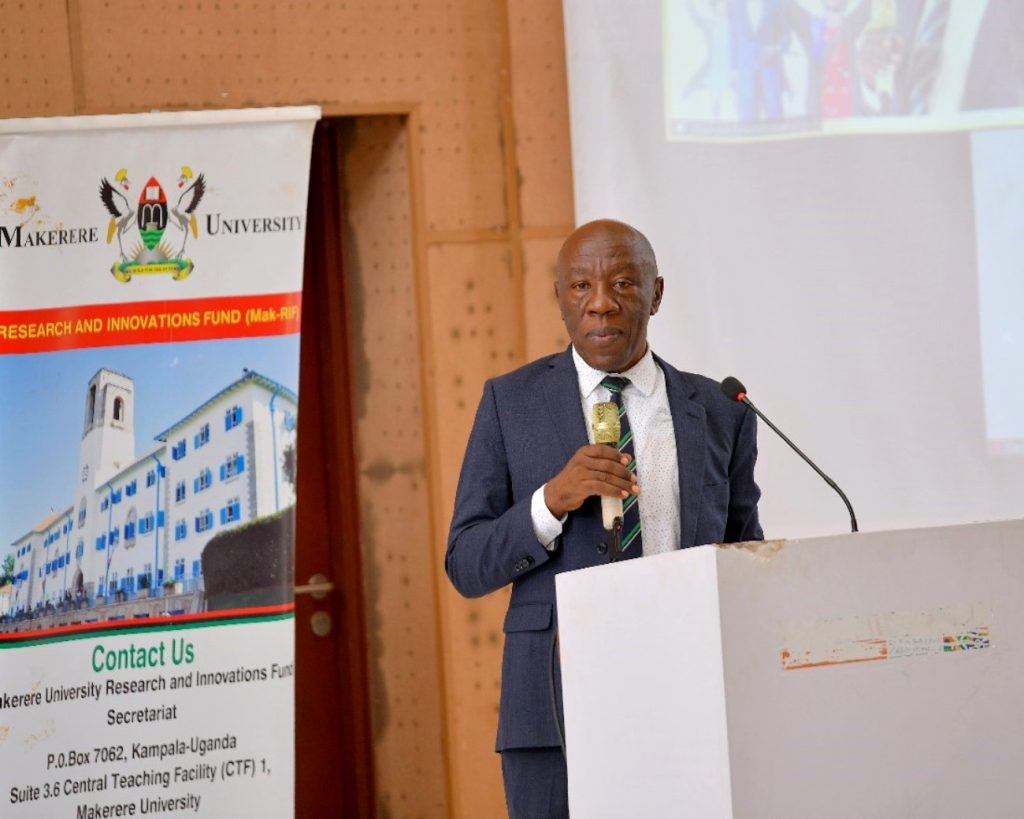
He thanked the Directorate for holding the Male engagement roundtable to discuss issues pertinent to them. He decried the dropping numbers of male graduates and called for an investigation into the causes.
Proposed objectives of a 4W Initiative Pilot at Makerere University
The Director for Africa 4W Women and Wellbeing Initiative at the School of Human Ecology, University of Wisconsin-Madison, USA, Ms. Deborah Kaddu-Serwadda noted that Uganda can leverage the successes of Makerere University’s gender mainstreaming policy to build a critical mass of university students, faculty, and staff, able to work together. She mentioned some of the proposed objectives of a 4W Initiative Pilot at Makerere University, Uganda as: piloting an interdisciplinary multigenerational higher education collaboration for the promotion of gender equality and women’s wellbeing. The pilot project would further initiate an academic women leaders’ South to North research-to-action network for gender equality and social transformation.
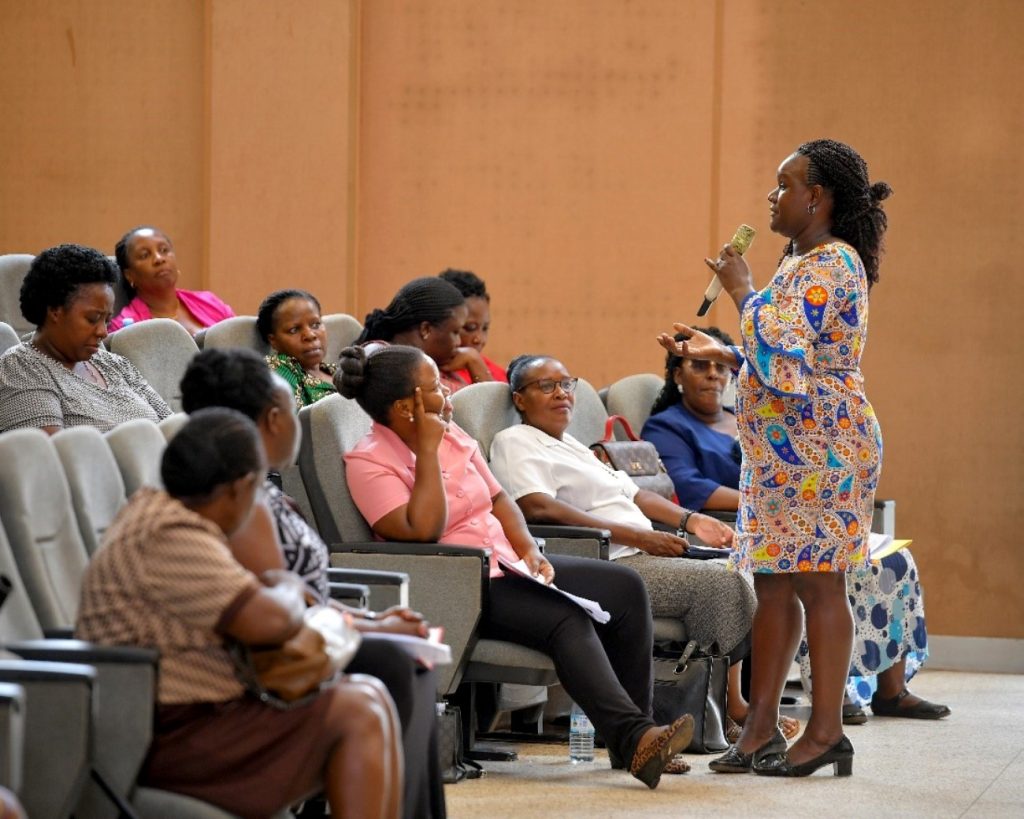
Giving the background on the women in leadership training workshops, a Principal Gender Officer at GMD, Ms. Susan Mbabazi noted that the programme had accomplished many activities such as ; 1) A situational analysis of the gender terrain of the 6 universities focusing on among others the gender composition of staff in leadership positions, 2) Development of training guides/manuals on women in leadership, mentorship, gender responsive research and male engagement, and 3) Findings of the situational analysis in the six participating universities were disseminated in each of them.
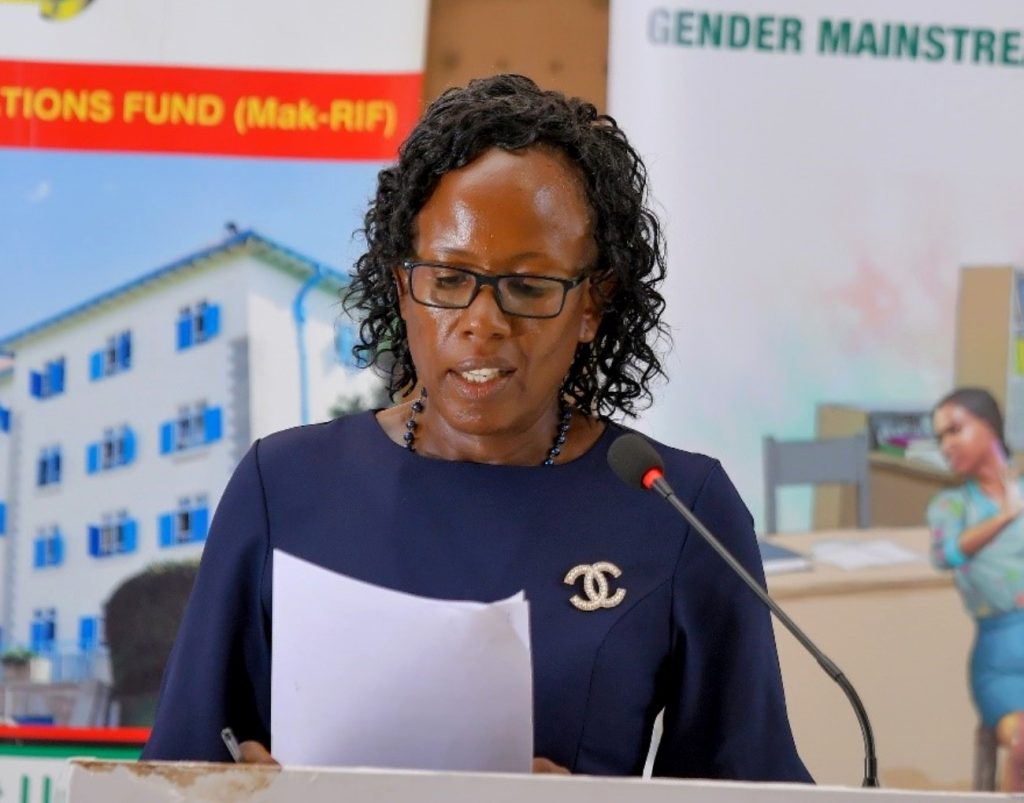
Ms. Mbabazi noted that that the programme still had pending activities such as conducting workshops using the developed training guides/manuals in all participating universities starting with Makerere University.
The Senior Gender Officer at GMD, Mr. Eric Tumwesigye commended women for being supportive and inspirational. “All the ladies I have moved and worked with in my life journey have really been inspirational,” he said.
The workshop was moderated by Mr. Tumwesigye and attended by senior academic and administrative female staff of Makerere University.
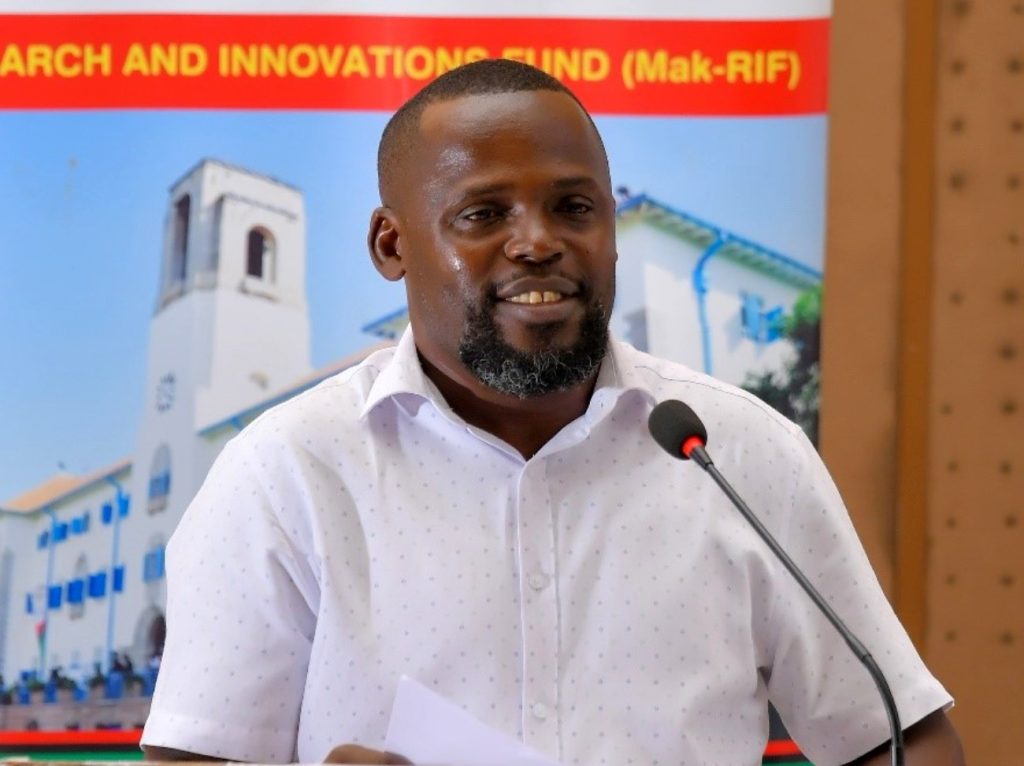
You may like
-


Makerere Graduation Underscores Investment in Africa’s Public Health Capacity
-


Botswana Delegation Visits Makerere’s Public Investment Management Centre to Study Sustainable Training Model
-


Makerere University commemorates 13 transformative years of partnership with Mastercard Foundation
-


200 UVTAB students graduate: CEES emphasizes Skills, Integrity and Community Impact
-


Celebrating Academic Excellence: CoBAMS Presents 975 Graduands at Mak 76th Graduation Ceremony
-


Makerere’s 76th Graduation Ceremony: CHS showcases research strength with 26 PhD Graduates
General
Makerere University commemorates 13 transformative years of partnership with Mastercard Foundation
Published
2 days agoon
March 2, 2026
On Friday, 27th February 2026, Makerere University proudly celebrated 13 years of a significant partnership with the Mastercard Foundation, a prestigious independent organisation headquartered in Toronto, Canada. Since its inception in 2013 with the launch of the Scholars Program-currently headed by Prof. Justine Namaalwa, this collaboration has grown significantly, expanding to include two additional initiatives: The E-learning Initiative-headed by Prof. Paul Muyinda Birevu and the Africa Climate Collaborative-headed by Prof. Gorretie Nabanoga. This long-term partnership underscores the shared commitment to fostering education, innovation, and sustainability in Uganda and across Africa.
The colourful event coincided with the 76th Graduation Ceremony, during which Makerere University honoured Ms. Reeta Roy, the Founding President and CEO of the Mastercard Foundation, with an honorary Doctor of Laws.

In her commencement speech, Ms. Roy thanked Makerere University for considering a partnership with the Mastercard Foundation and for conferring upon her a prestigious honorary award.
“Mastercard Foundation is honoured to collaborate with this esteemed university, and I appreciate the recognition through this award. I am excited to be associated with Makerere University and look forward to actively embodying its values. Joining the broader community of alumni from this distinguished institution is a privilege, and I am eager to contribute to its legacy,” stated Ms. Roy.

During the reception in honour of Ms. Roy, the Chairperson of Makerere University Council, Dr. Lorna Magara, acknowledged the invaluable support from the Mastercard Foundation. She emphasised the profound impact of the Foundation’s various initiatives, particularly the scholarships for disadvantaged youth, which enable them to access higher education and opportunities that might have otherwise been beyond their reach.
“On behalf of the Makerere University Council and the broader University community, I extend our sincere gratitude to Mastercard Foundation for its commitment to collaborating with Makerere University in various endeavours, especially for providing scholarships to our underprivileged young people who would never have stepped inside a lecture room at the University.” Dr. Magara stated.

Dr. Magara, in a special way, thanked Ms. Roy for her transformative leadership and unwavering commitment to supporting young people in Africa, citing her efforts to ensure young people get their voices heard.
“As a university, our business is with young people. We are therefore committed to providing the environment and education that deliver meaningful pathways. We will provide an environment that ensures young people have a voice and agency to create meaningful change in society.” Dr. Magara pledged.

Dr. Magara further congratulated Ms. Roy on her honorary Doctor of Laws from Makerere University, noting that it is the university’s highest honour for individuals who have excelled in their careers.
“On behalf of the Makerere University community, I would like to extend my heartfelt congratulations on your honorary Doctor of Laws. This esteemed recognition represents the highest honour our institution can bestow on individuals who have demonstrated exceptional achievement and excellence across various facets of their career.” Dr. Magara remarked.
Prof. Justine Namaalwa, the Program Director of the Mastercard Foundation Scholars Program and the Coordinator for all Mastercard Foundation Initiatives at Makerere University, expressed her appreciation for the thirteen-year collaboration between Makerere University and the Mastercard Foundation. She highlighted that the partnership had yielded significant, impactful results.

“In 2013, Makerere University partnered with the Mastercard Foundation to educate the next generation of transformative African leaders who can positively impact their lives, their communities, and the economies of Africa. The partnership has had a significant impact. I thank the University Management and the Foundation team for this visionary collaboration,” remarked Prof. Namaalwa.
Prof. Namaalwa articulated that the partnership with the Mastercard Foundation is primarily focused on empowering young people as agents of change for transformational leadership in Africa. She presented compelling statistics demonstrating the positive impact of the scholars’ program, highlighting the success of individuals who have completed their education and their subsequent professional experiences after university graduation.

“This partnership focuses on young people, aiming to create positive change in their lives. To date, the Scholars Program has graduated 974 alumni, with 48% securing formal employment, 18% starting their own businesses, 8% participating in internships, and 5% pursuing further education. Overall, 72% of Scholar alumni are actively engaged in employment or entrepreneurship,” Prof. Namaalwa stated.
The colourful event showcased a dynamic array of activities that highlighted the entrepreneurial spirit of Scholars and alumni from the Mastercard Foundation at Makerere University. Attendees enjoyed a mini-exhibition featuring innovative products from these ventures.

A video documentary illustrated the positive impact of the three Mastercard Foundation initiatives. The event also featured inspiring poetry recitations by Scholars and a lively atmosphere of music and dance, creating an engaging and memorable experience for all participants.
The high-level event was attended by senior University officials, led by the Chairperson of Council, Dr. Lorna Magara; the Vice-Chancellor, Prof. Barnabas Nawangwe; the Vice-Chancellor, Academic Affairs, Prof. Sarah Ssali, Deputy, and the Ag. Deputy Vice-Chancellor, Finance and Administration Prof. Winston Tumps Ireeta. Mr Yusuf Kiranda, the University Secretary; and Prof. Buyinza Mukadasi, the Academic Registrar, Chancellor Emeritus-Prof. Ezra Suruma, former Chairperson of the Steering Committee of Mastercard Foundation Scholars Program-Prof. Umar Kakumba, and the Deputy Executive Secretary, RUFORUM, and former Program Coordinator of the Scholars Program at Makerere University-Dr. Florence Nakayiwa, among many other officials graced the function.

The event was also graced by a high-level delegation from the Mastercard Foundation, led by Ms. Reeta Roy, the Founding President of the Foundation, and included the Mastercard Foundation Teams from the Country offices in Kigali, Nairobi, and Kampala; the Program partners; the Mentors, Scholars and alumni; as well as the Program staff of the three Mastercard Foundation Initiatives at Makerere University.
At the end of the event, Makerere University honoured Ms. Reeta Roy with University memorabilia, including a pencil-drawn portrait, a pencil-drawn photo of the Ivory Tower, and other Ugandan crafts. Ms. Roy cut a graduation cake together with the 10 graduates of the 76th graduation ceremony from the Mastercard Foundation Scholars Program.
Bernard Buteera is the Principal Public Relations Officer for the Mastercard Foundation Scholars Program at Makerere University.

It is with great pleasure that I welcome you to this edition of Mak News Magazine, a publication that continues to chronicle Makerere University’s journey as a centre of academic excellence, innovation, and societal transformation.
The stories featured in this issue vividly demonstrate Makerere’s unwavering commitment to addressing national, regional, and global challenges through research, partnerships, and people-centred solutions. They reflect a university that is deeply engaged with society, one that applies knowledge not only to advance scholarship, but also to improve lives.
A recurring theme in this edition is innovation for resilience and inclusion. From the College of Agricultural and Environmental Sciences’ Healthy Soy Initiative combating child malnutrition amid climate change, to the cutting-edge work of CEDAT’s Team Green Minds integrating IoT into agriculture, Makerere continues to harness science and technology to respond to pressing development needs. Equally inspiring is the College of Natural Sciences’ success in securing international funding to scale up fish processing technologies, with a deliberate focus on empowering women and strengthening livelihoods.
This issue also highlights Makerere’s growing role in advancing health and wellbeing. The launch of the Early Intervention Psychiatry Services Clinic at Makerere University Hospital marks an important step in strengthening mental health services, while the Hospital’s transformation from a modest sickbay into a centre of excellence stands as a testament to decades of strategic investment, dedication, and service to the nation.
Our commitment to education access and global engagement is equally evident. Strategic partnerships, such as that between the College of Education and External Studies and the Uganda Vocational and Technical Assessment Board, are expanding pathways to quality education. The establishment of the first-ever United States Studies Centre in the Great Lakes Region positions Makerere as a hub for dialogue, research, and policy engagement on global affairs. We also celebrate our vibrant international community, with graduates drawn from 67 nationalities—affirming Makerere’s status as a truly global university.
This edition further showcases initiatives that ensure long-term institutional sustainability, including the launch of the CoCIS Endowment Fund, infrastructure developments such as the modern hostel at Buyana Farm, and transformative programmes supported by the Mastercard Foundation that continue to empower young people across the continent.
As you read through these pages, I invite you to reflect on the collective effort of our students, staff, alumni, partners, and supporters whose contributions make these achievements possible. Together, we continue to shape Makerere University as a place where knowledge serves humanity.
I wish you an engaging and inspiring read.
Prof. Barnabas Nawangwe
VICE CHANCELLOR

The Board Chairperson of the Makerere University Endowment Fund (MakEF), Dr. Margaret Blick Kigozi, has urged graduands in Health and Life Sciences to uphold professional ethics and serve humanity with diligence and compassion.
Her appeal came during the passing out of graduates from the College of Natural Sciences (CoNAS), the College of Veterinary Medicine, Animal Resources and Bio-Security (CoVAB), the College of Health Sciences (CHS) and the School of Public Health (SPH) on Day Two of the 76th Graduation Ceremony of Makerere University.
“Class of 2026, you are now part of the Makerere legacy. Wherever you go clinics, laboratories, farms, boardrooms, or classrooms, you carry this institution with you. Serve your patients with skill and compassion. Care for animals and communities responsibly. Question boldly and keep learning,” Dr Kigozi, said.
Delivering the commencement address, Dr. Kigozi lauded the graduates for their dedication to careers that directly impact lives and communities. She encouraged them to use their knowledge generously and exercise their power gently.
“Your education has trained you to ask better questions. Your humanity must guide the answers. Never forget that behind every chart, every case, every animal, every experiment, there is life. And life deserves care, patience, and dignity. Give every person you come in contact with care, patience and dignity,” Dr Kigozi, noted.
As the graduates embark on their professional journeys, Dr. Kigozi emphasized the importance of cultivating basic business acumen and financial literacy to ensure sustainability in their work.

“You do not need to become accountants but you must be able to read the essentials: understand simple financial statements, budgets and key metrics so you can judge whether a clinic, lab, or program is sustainable. You are encouraged to start your business. There are numerous investment opportunities in your areas of training. You can provide services to our people and create jobs,” Dr Kigozi, said.
She shared candidly how, when she first stepped into leadership, she realised she did not understand balance sheets or budgets well enough. So, she returned to Makerere for short courses to strengthen herself.
“A well-run Hospital, clinic or lab delivers better outcomes, attracts staff, and secures funding. Business savvy is not only about profit, it’s about sustainability and the freedom to serve ethically and effectively. Carry clinical skill with business sense so your work endures and grows,” Dr. Kigozi, noted.
Quoting renowned writer and producer Shonda Rhimes, creator of Grey’s Anatomy, who once reflected that succeeding in one area of life can sometimes mean falling short in another, Dr. Kigozi encouraged women graduates to intentionally balance professional ambition with family responsibilities.
“When one area thrives, another is often under strain. When Navio was graduating from school I had to manage the Presidential Investor Round Table on the same day as Executive Director Uganda Investment Authority. I chose my job and delegated his siblings to attend Navios graduation. I learnt from this. I choose family always after that thing you achieve once and keep forever,” Dr Kigozi, said.
In his speech, the Prof Barnabas Nawangwe, the Vice Chancellor, informed the congregation that Makerere’s ranking on all university ranking platforms has remained stable, placing Makerere among the top 10 African universities and within the top 4.5% globally.
“In the Times Higher Education global ranking, Makerere University made a formidable jump from the 1200-1500 bracket to the 800-1000 bracket. This was no mean achievement and I congratulate all members of the Makerere Community on this stellar performance,” Prof Nawangwe, said.
Trending
-

 Humanities & Social Sciences1 week ago
Humanities & Social Sciences1 week agoMeet Najjuka Whitney, The Girl Who Missed Law and Found Her Voice
-

 General1 week ago
General1 week ago76th Graduation Highlights
-

 Health2 weeks ago
Health2 weeks agoUganda has until 2030 to end Open Defecation as Ntaro’s PhD Examines Kabale’s Progress
-

 Agriculture & Environment2 weeks ago
Agriculture & Environment2 weeks agoUganda Martyrs Namugongo Students Turn Organic Waste into Soap in an Innovative School Project on Sustainable Waste Management
-

 General2 weeks ago
General2 weeks agoMastercard Foundation Scholars embrace and honour their rich cultural diversity
